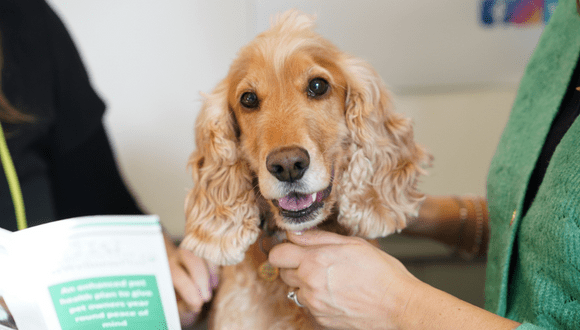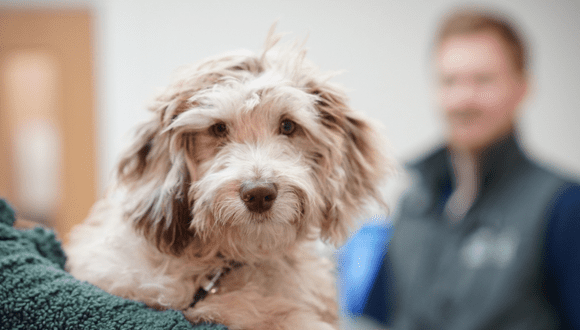
Vaccinations for Dogs, Cats & Rabbits
Portland Vets strongly recommends vaccinating your pet. The vaccines we offer are an essential part of providing your pet comprehensive care and protecting them against diseases that could make them seriously unwell. To book your pet in for their vaccination, contact our reception team.
Antibody titre testing
Our team always use the most current vaccines available to help promote immunity against the latest virus strains. We take an informed, scientific approach to how we vaccinate your pet and also offer antibody titre testing – a type of blood test that can determine if your pet has enough immunity to fight off certain infections.
If you would prefer to test your pet’s current immunity, results take 48 hours to become available and we can then tailor your pet’s vaccination course to suit their needs. Please be aware that antibody titre testing is not suitable for every pet so it is best to book in with a vet who can discuss all the options for you.
What do routine vaccinations protect against?
Take a look at the sections below to find out what each vaccination protects your pet from and also how frequently the course must be given. Don’t forget to contact our team if you have any further questions regarding vaccinations.
Puppies and Kittens
When your puppy or kitten is born, they are usually protected against most diseases thanks to their mother’s colostrum. Colostrum is the milk they receive shortly after birth that passes along essential nutrients and antibodies to help the baby’s immunity. However, this can only happen if the mother was vaccinated to help her become immune to certain diseases.
Within a few weeks the immunity from the colostrum will have faded and your puppy or kitten will be susceptible to disease. This is when you begin the vaccination course to take over the protection that the mother of your pet can no longer provide.
Dogs
When your puppy reaches 8 weeks old, they can begin their initial vaccinations. These primary vaccinations are given at 8, 10 and 12 weeks of age with annual boosters given every year thereafter to ensure their immunity levels are high to protect them from the higher risk diseases. At every vaccination appointment, your pet will receive a full and thorough health check and your vet will always be happy to discuss any concerns you may have.
At Portland Vets we vaccinate against the following viruses:
Canine Parvovirus: A hardy virus that causes severe vomiting and diarrhoea which would both contain blood. It caused major epidemics in the 1970’s and remains widespread in pockets throughout the UK. This virus is unfortunately, usually fatal.
Canine Distemper: Another severe, most usually fatal, disease that is mercifully rare in the UK. However, major outbreaks have occurred in Europe.
Infectious Hepatitis: Still exists in the UK although it is exceptionally rare thanks to vaccination.
Leptospirosis: This disease is contracted from the urine of rats and/or other dogs. Canal, rivers and ponds can be contaminated with forms of the disease and leptospirosis has been found in our area before. It can also cause disease in people (Weil’s Disease).
There are a number of strains of leptospirosis and in recent years it has been recognised that a greater number of strains are causing disease in the UK. As such we recommend vaccinating with the L4 vaccine which provides protection against 4 strains of leptospirosis. There is a different vaccine only helps to protect against 2 of the strains which we are happy to discuss with you at your pet’s appointment.
Kennel Cough: Extremely unpleasant, whooping-cough-like infection. It is rarely life threatening but very unpleasant and not just restricted to kennels.
Rabies: Fatal Disease luckily not found in the UK. Vaccination against rabies is required as part of the pet travel scheme to take your dog abroad. To find out more about taking your pet abroad, visit our Pet Travel <link to pet travel page> page.
Cats
Your kitten will be given their first vaccinations at 9 and then 12 weeks of age. Following this, adult booster vaccinations are given annually. This is because 12 months is the approximate length of immunity provided to your pet via the vaccination course, so it is best to keep their boosters up to date to protect them.
Portland Vets offers vaccinations to help protect your pet from the following diseases:
Feline Infectious Enteritis (panleukopenia) – This is a usually fatal virus which causes bloody diarrhoea and severe dehydration. Thankfully, due to vaccination, this disease is now much less common in the UK.
Feline herpesvirus and calicivirus (also known as feline upper respiratory disease or cat ‘flu’) – These 2 viruses are very common and cause symptoms such as eye ulcers, oral ulcers and even pneumonia. They are often accompanied by a secondary bacterial infection and can be fatal if severe.
Feline Leukaemia Virus – This is a common cause of death in the UK cat population. Cats fighting each other is the common cause of infection as it is transmitted by saliva and blood. The virus attacks the blood cells and bone marrow and can make cats susceptible to infection, anaemia and cancer. Only early vaccination and regular boosters will protect against the virus. However, house cats who do not go outside do not need to have this vaccination.
Rabies – A fatal disease luckily not found in the UK. Vaccination is required as part of the passport scheme to take your cat abroad. To find out more about taking your pet abroad, visit our Pet Travel <link to pet travel page> page.
Rabbits
Portland Vets offer rabbit vaccinations to help protect your rabbit from various fatal diseases. The initial booster is done after 5-7 weeks of age and then a booster is given annually. The vaccinations are designed to protect your rabbit against:
Myxomatosis: A disease transmitted by insects that is fatal to rabbits.
Rabbit Viral Haemorrhagic Disease 1 and 2 (VHD1 and VHD2): Another common disease that rabbits are susceptible to, causing sudden death. A symptom prior to death can be unusual bleeding.
A vaccine combining those three diseases is available and is used as a single injection providing immunity for 12 months. If your rabbit was vaccinated before with a different vaccine, your vet will discuss the plan to switch to the single vaccine with you during the appointment.
To book your pet’s vaccination appointment, do not hesitate to contact our East Grinstead practice.











